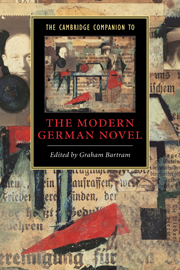Book contents
- Frontmatter
- 1 The German novel in the long twentieth century
- 2 Contexts of the novel
- 3 The novel in Wilhelmine Germany
- 4 Gender anxiety and the shaping of the self in some modernist writers
- 5 Franz Kafka
- 6 Modernism and the Bildungsroman
- 7 Apocalypse and utopia in the Austrian novel of the 1930s
- 8 Images of the city
- 9 Women writers in the ‘Golden’ Twenties
- 10 The First World War and its aftermath in the German novel
- 11 The German novel during the Third Reich
- 12 History, memory, fiction after the Second World War
- 13 Aesthetics and resistance
- 14 The kleiner Mann and modern times
- 15 The ‘critical’ novel in the GDR
- 16 Identity and authenticity in Swiss and Austrian novels of the postwar era
- 17 Subjectivity and women’s writing of the 1970s and early 1980s
- 18 The postmodern German novel
- Index
- Series List
7 - Apocalypse and utopia in the Austrian novel of the 1930s
Hermann Broch and Robert Musil
Published online by Cambridge University Press: 28 May 2006
- Frontmatter
- 1 The German novel in the long twentieth century
- 2 Contexts of the novel
- 3 The novel in Wilhelmine Germany
- 4 Gender anxiety and the shaping of the self in some modernist writers
- 5 Franz Kafka
- 6 Modernism and the Bildungsroman
- 7 Apocalypse and utopia in the Austrian novel of the 1930s
- 8 Images of the city
- 9 Women writers in the ‘Golden’ Twenties
- 10 The First World War and its aftermath in the German novel
- 11 The German novel during the Third Reich
- 12 History, memory, fiction after the Second World War
- 13 Aesthetics and resistance
- 14 The kleiner Mann and modern times
- 15 The ‘critical’ novel in the GDR
- 16 Identity and authenticity in Swiss and Austrian novels of the postwar era
- 17 Subjectivity and women’s writing of the 1970s and early 1980s
- 18 The postmodern German novel
- Index
- Series List
Summary
In 1930, six years after the publication of The Magic Mountain, there appeared the first parts of two novels by Austrian writers that were destined to take their place alongside Mann's work as summative achievements of European modernist fiction. Hermann Broch's 1888. Pasenow oder die Romantik (Pasenow the Romantic (1888)) was the first volume of the trilogy Die Schlafwandler (The Sleepwalkers, 1932), whose second and third parts were published in 1931 and 1932; Book 1 of Robert Musil's Der Mann ohne Eigenschaften (The Man Without Qualities, 1953-60) was followed by a portion of Book 2 in 1933, but the work remained incomplete, a massive fragment, on its author's death in 1942.
Like The Magic Mountain, both The Man Without Qualities and The Sleepwalkers take the First World War as the chronological end-point of their fictional worlds. In Musil’s novel, set in Vienna on the eve of its outbreak, the war hovers as a huge irony, a knowledge, shared by author and readers, of the destruction that is about to engulf the traditional social world that its unwitting characters inhabit. Broch’s trilogy, whose first two parts 1888. Pasenow oder die Romantik and 1903. Esch oder die Anarchie (Esch the Anarchist (1903)) are set in 1888 Berlin and 1903 Cologne/Mannheim respectively, locates its third novel 1918. Huguenau oder die Sachlichkeit (Huguenau the Realist (1918)) amidst the débâcle of Germany’s defeat.
- Type
- Chapter
- Information
- The Cambridge Companion to the Modern German Novel , pp. 93 - 109Publisher: Cambridge University PressPrint publication year: 2004



